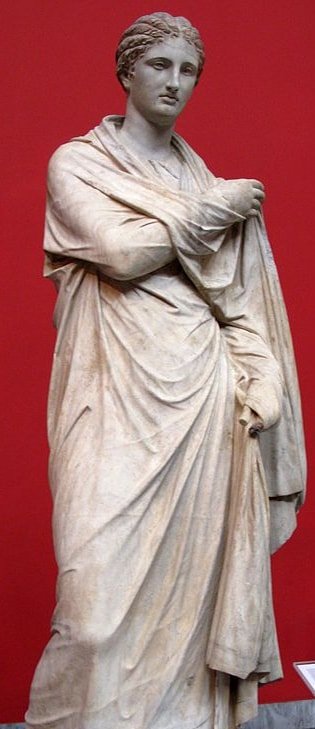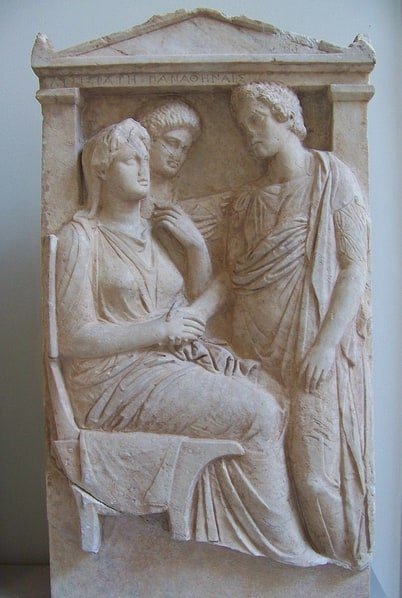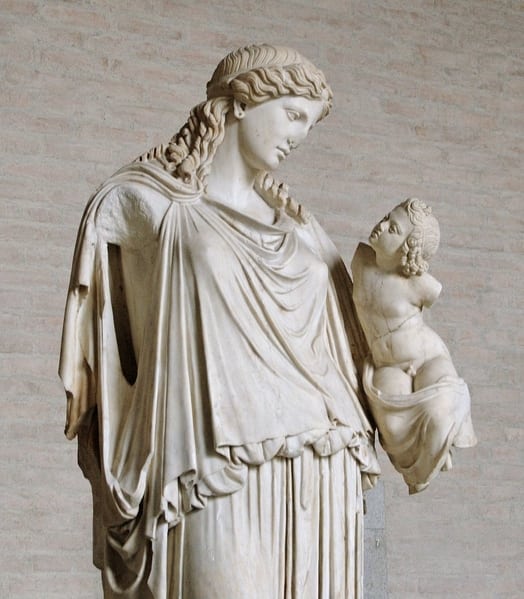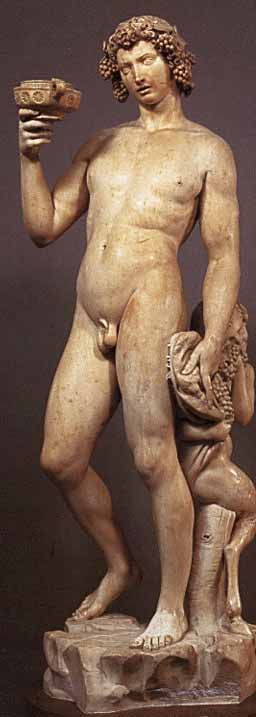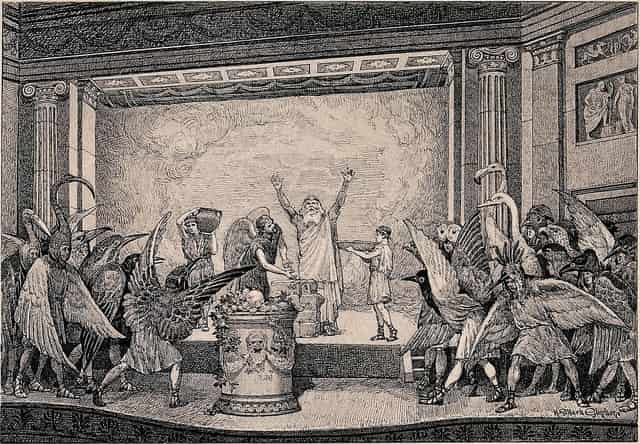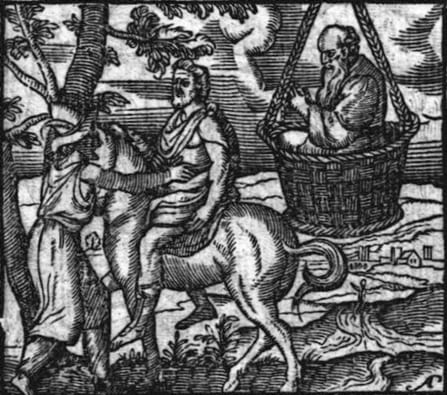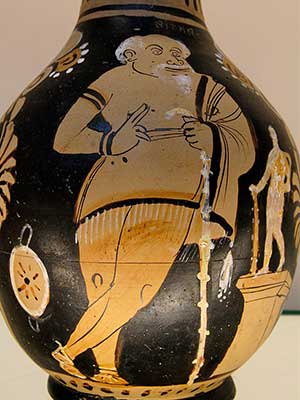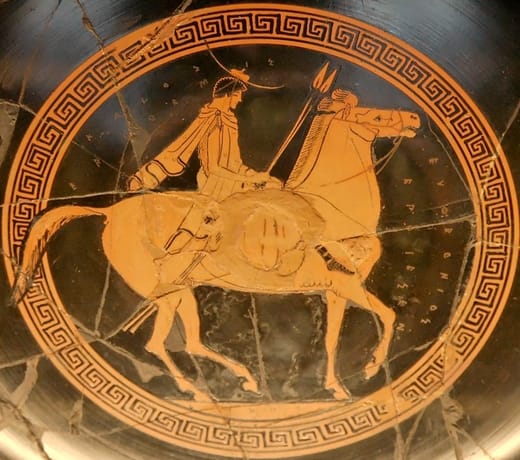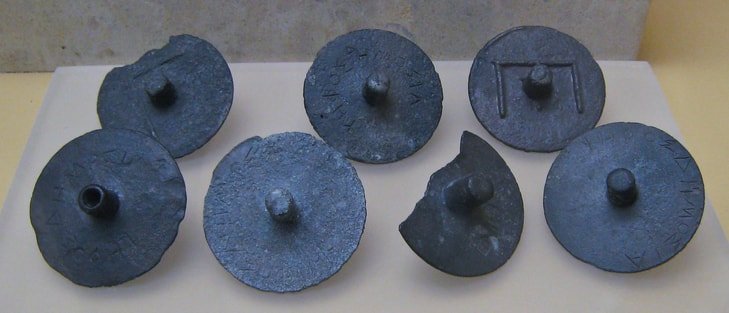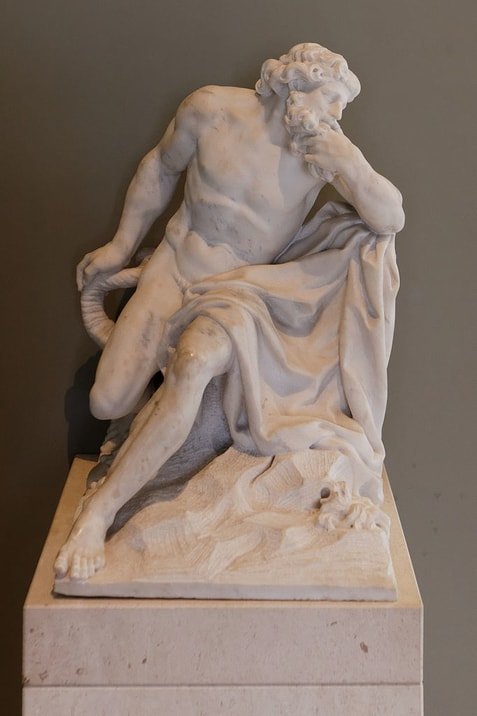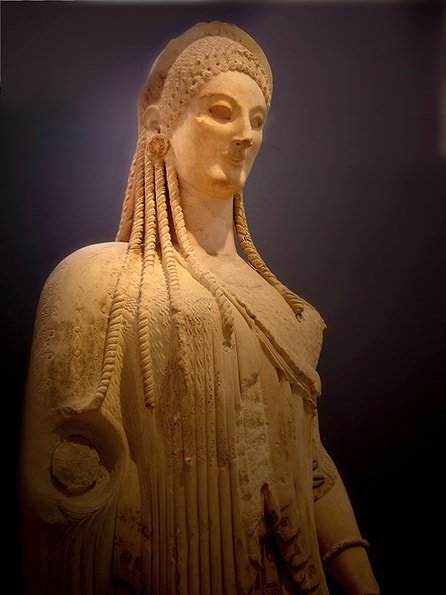Aristophanes
Routinely described as “the father of comedy” and “the greatest ancient comic writer,” Aristophanes was born in the early 440s, most probably in 447/6. He debuted barely out of his teenage years with The Banqueters in 427 BC (now lost), and won the first prize at both the Dionysia and the Lenaea with his following two plays: The Babylonians and The Acharnians. Unfortunately, his attack on some of the Athenian customs caught the eye of the most powerful politician of the day, Cleon, who denounced him before the Athenian council. Instead of backing down, Aristophanes went on attacking Cleon incessantly – even after the politician died in 422 BC. He practically dominated the 420s with no less than seven prizes, but he seems to have enjoyed fewer successes afterward: we don’t hear of an Aristophanic victory before 405 BC when he produced The Frogs. The play was reperformed by civic decree the very next year, but this might have been a political maneuver by the Thirty Oligarchs, a pro-Spartan coalition that came to power in Athens after the end of the Peloponnesian War. A conservative, Aristophanes may have even sided with them, but even if that was the case, he reclaimed his reputation afterward and won first prizes with some of his last plays: the surviving Wealth and the lost Cocalus. All in all, he seems to have written about 40 comedies, of which 11 survive to this day. They are all examples of a style called Old Comedy, but it can be argued that Wealth is already a Middle Comedy play, and, based on what we know, Cocalus may have anticipated almost all of the elements typical for New Comedy. Innovative until the very end, Aristophanes is practically the only Ancient comic author that can be studied more closely today. Even though already in Antiquity, Aristophanes’ fame was eclipsed by that of the New Comedy author Menander, all but one of Menander’s plays were somehow lost during the Middle Ages. In spite of their topicality and choral style, one-fourth of Aristophanes’ comedies survived – and most of them are regularly performed and adapted throughout the world today.
Aristophanes’ Life and Works
Life
Aristophanes, the son of son of Philippus from the city deme of Cydathenaeum, was born in the 440s. Though unsubstantiated, his traditional birth date of 444/3 BC is probably not far from the truth; 447/6 BC seems a bit more likely. Either way, he started competing at the major Athenian festivals in his early 20s. His first play, The Banqueters, won the second prize at the Lenaean festival of 427 BC; The Babylonians, his second play – performed the very next year at the City Dionysia – might have fared even better. On both occasions, Aristophanes didn’t produce the plays under his own name: a friend of his by the name of Callistratus undertook the production on his behalf. Callistratus’ name also appears in the festival records next to The Acharnians, The Birds and Lysistrata. A few other plays by Aristophanes were produced by another colleague of his, named Philonides – most notably The Frogs.
The Babylonians didn’t only win the affection of the Athenian public, but also the attention of the most powerful politician of the day: Cleon. According to a few verses from The Acharnians (produced in 425 BC) – and presumably for “slandering the city of Athens in the presence of foreigners” – Cleon threatened Aristophanes with prosecution and denounced him before the Athenian Council. We don’t know whether the case was taken to court, but we do know that Aristophanes didn’t back away: he devoted his next play, The Knights (424 BC) almost entirely to Cleon, viciously attacking him as a good-for-nothing demagogue. The Knights was the first play Aristophanes produced himself; it immediately won him the first prize. Even so, Cleon was elected to a generalship just a few weeks later.
Up to this point, all of Aristophanes’ plays seem to have been hits and by the time he presented The Clouds at the City Dionysia of 423, he may have been already deemed the greatest comedian in Athens. However, The Clouds – a lampooning of Socrates and sophism – was an instant failure. Ironically – at least if we are to believe Plato – the play quite successfully contributed to damaging Socrates’ reputation and may have even been a factor in his death sentence. After The Clouds, Cleon renewed his threats of prosecution, and Aristophanes was forced to agree to be more balanced in his attacks in future. He wasn’t: at the very next Lenaean festival, he produced The Wasps (422 BC), once again mercilessly ridiculing the politician, and even going so far to portray him as the man responsible for the corrupt Athenian jury system.
Cleon was killed in action in 422 BC, but this didn’t stop Aristophanes from attacking him once again in Peace, which was produced the next year. During the following decade, Aristophanes wrote, arguably, his best-known comedies: The Birds, Lysistrata, and Women at the Thesmophoria. In 405 BC he won the first prize with The Frogs and not long after, he was commended by the Athenian Assembly and awarded a crown of sacred olive for the political advice he had given in this play; in a very rare event, the play was ordered to be restaged the same year. In retrospect, it is quite possible that this didn’t have much to do with the play’s aesthetic qualities, but with the overall political situation in Athens. That year, a pro-Spartan oligarchy (the Thirty Tyrants) was installed in Athens, after the city’s defeat in the Pelopponesian War. A man of old-fashioned ethical values and a closeted Laconophile (that is, lover of Sparta), Aristophanes may have even taken part in this political maneuver knowingly; even if not, it is probable that his art was abused for political purposes by the oligarchs.
The rule of the Thirty ended ingloriously in 403 BC, and Aristophanes was somehow able to reclaim his status during the following years, for in 390 BC, his name appears on an inscribed list of members of the Council, meaning he was deemed fit to represent his tribe in public matters. Just two years before this, Assemblywomen was performed, and two years later, Wealth, the last play produced in Aristophanes’ own name. His last two plays, Cocalus and Aeolosicon, were produced for him by his son Araros; the fomer won first prize at the City Dionysia. Aristophanes probably died in 386 BC – though it is quite possible that he may have lived half a decade more. Araros later became a comic dramatist in his own right, just as his brother Philippus. Neither they nor any other comedian after Aristophanes – with the exception of Menander – reached the height of his art or the extent of his glory.
Plays
Even though the anonymous On Comedy puts the total of Aristophanes’ plays at 54, in the Alexandrian Life, ancient scholars ascribe 44 comedies to the name of the great comedian. Moreover – even then and even to them – four comedies (Dionysus Shipwrecked, Dramas or Niobus, Islands, and Poesy) seemed spurious. Out of the remaining 40, 11 plays survive complete to this day, and there are more than 1000 fragments of the other lost plays. It’s also important to note that, at least on five occasions, Aristophanes tried revising old plays for new occasions. The text of The Clouds that has reached us is one such revision – and not the play that was originally performed in 423 BC.
The total number of victories Aristophanes gained in the competitions is not known, but it’s very likely that he was the most successful comedian of the 420s, winning at least first four prizes and three second prizes over this period. We know of no less than two more victories at the big festivals (Dionysia and Lenaea), and one more at a local festival at Eleusis. That brings the total of trophies to seven, but it’s quite possible that there may have been even more. It’s also very unlikely that Aristophanes’ main rivals – Eupolis, Crates, Phrynichus, and Plato Comicus – emerged victorious more times than him.
Legacy
In The Encyclopedia of Greek Comedy, Jeffrey Henderson writes that Aristophanes “took particular pride in three of his contributions to the genre in the 420s:” greater sophistication, the absorption of tragic dramaturgy and thematic political criticism.
As far as sophistication is concerned, Aristophanes’ comedies regularly deal with serious intellectual and literary/theatrical subjects. According to Henderson, he is “the only comic poet recorded as claiming intellectual sophistication as a virtue.” Even though this was ridiculed by one of his rivals, it seems that Aristophanes survived precisely because of his sophistication, which – thanks to his success and subsequent influence – became a “touchstone for comedy.”
Even before Aristophanes, comedies parodied serious works, but “the scale and virtuosity of the paratragedy in The Acharnians seems epochal, creating a new comic-tragic hybrid that Aristophanes dubbed ‘trugedy.’” Aristophanes especially enjoyed in parodying Euripides who appears as a character in two of his surviving plays: The Clouds and Women at the Thesmophoria. The latter is especially notable for several recreations of Euripides’ tragedies in a comic environment.
Finally, Aristophanes was probably responsible from transforming comedy from a frivolous genre with merely a few incidental political jokes into a socially responsible artistic form, filled with “sustained, coherent, and thematic political criticism.” Once again (as Henderson notes), “Aristophanes is the only comic poet recorded as professing by such criticism to be a public benefactor: with divine support he fights on behalf of the Athenians and against persons and policies that threaten their wellbeing as courageously as a Heracles against monsters; gives them good advice and instruction; and always champions truth and justice regardless of the risk to himself.”
Throughout Aristophanes’ career, both his style and the structure of his plays evolved. We have too little information to deduce if the changes were part of a larger movement, but based on the plays that have reached us, Aristophanes started as a typical Old Comic poet. His early plays all follow a similar structure. They start with a prologue that explains the initial situation and offers the protagonist an opportunity to explain his great idea – one that should change the world. Then follows an entry of the chorus in the so-called parodos. Afterward, there’s a formal debate (the agon) between the protagonist and someone who doesn’t believe in the practicality of his idea; this ends with the victory of the hero and the new idea is put into effect. To mark the interlude and the passage of time, the Chorus steps forward in the parabasis, during which the plot of the play is not mentioned, and instead some political topics are discussed. We then return to world of the play, and see – through a series of episodes – the consequences of the change. Typically, Old Comic plays end with an exodos, in which the chorus leaves the stage while singing, dancing and feasting.
By the time of Lysistrata, Aristophanes began to show greater freedom in manipulating these six elements. In his following plays, the chorus gradually loses his role, the agon is truncated and there’s no parabasis. It is difficult to classify his last two surviving plays – Assemblywomen and Wealth – as Old Comic productions; the two lost plays that followed – Aeolosicon and Cocalus – were probably even more innovative. Aeolosicon – informs us Alan Sommerstein – was described in Antiquity as a typical Middle Comedy play, while Cocalus is said to have contained recognitions and many other elements imitated subsequently by the New Comedy writer Menander. Moreover, it is said that another New Comedy poet, Philemon, adapted the plot of Cacalus for one of his works with little or no change whatsoever.
In other words, Aristophanes remained innovative and successful up to the very last years of his life. Even though his 11 plays are the only complete examples of Old Comedy – and we have no other plays to compare them to – he seems to have been a master of the genre. Moreover, his position as the foremost poet of Old Comedy was very rarely questioned, and pretty mildly. Aristotle lists him as the most representative comic author in his Poetics, and Plato includes him in his dialogue Symposium as the voice of Comedy itself. It is to Plato that the ancients attributed Aristophanes’ beautiful and telling epitaph: “The Graces, looking for an imperishable shrine, found the soul of Aristophanes.”
Chronology of Aristophanes’ Life
• 447/8 – born, probably at Athens
• 427 – debut with the now-lost Banqueters at the Lenaea; the play was produced by Callistratus
• 426 – The Babylonians is performed at the City Dionysia; subsequent row with Cleon
• 425 – The Acharnians wins first prize at the Lenaea; the first play produced by Aristophanes himself
• 424 – The Knights wins first prize at the Lenaea
• 423 – The Clouds suffers a fiasco at the City Dionysia
• 422 – The Wasps wins second prize at the Lenaea
• 421 – The Peace wins second prize at the City Dionysia
• 418 – Aristophanes gives up revising The Clouds
• 414 – the now-lost Amphiaraus is produced at the Lenaea by Philonides
• 414 – The Birds wins second prize at the City Dionysia
• 411 – Lysistrata is produced by Callistratus at the Lenaea
• 411 – Women at the Thesmophoria is produced at the City Dionysia
• 408 – The first version of Wealth is produced at one of the two big festivals
• 405 – The Frogs, produced by Philonides, wins first prize at the Lenaea
• 404 – in a rare show of respect, The Frogs is reperformed by civic decree
• 391 – Assemblywomen
• 388 – Wealth, the second version, wins first prize
• 387 – Araros, Aristophanes’ son, wins victory with his penultimate play Cocalus
• 386 – Araros produces yet another play by his father Aeolosicon
• 386/5 – Aristophanes dies
Sources
You can read the Alexandrian Life of Aristophanes here, beautifully translated and excellently annotated by Sarah Burges Wilson. The entry for the great author in the medieval encyclopedia, the Suda, is “a horrible mixture of fact and fantasy,” but you can nevertheless flick through a translation here. For a more modern biography with links to relevant sources, consult Jeffrey Henderson’s article in the Perseus Encyclopedia. For the more curious and inquisitive ones, be sure to read Sarah Burges Wilson’s “Aristophanes: A Guide to Selected Sources,” which links to original versions and translations of almost all essential ancient sources for Aristophanes’ life and works.
Link/cite Aristophanes page
Written by: The Editors of GreekMythology.com. GreekMythology.com editors write, review and revise subject areas in which they have extensive knowledge based on their working experience or advanced studies.
For MLA style citation use: GreekMythology.com, The Editors of Website. "Aristophanes". GreekMythology.com Website, 03 Sep. 2020, https://www.greekmythology.com/Plays/Aristophanes/aristophanes.html. Accessed 27 April 2024.

